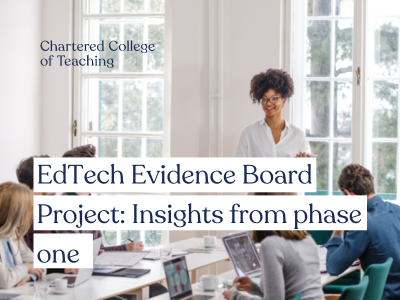In an educational landscape which is becoming increasingly shaped by digital innovation, educators are turning to EdTech solutions to enhance teaching and learning. But with the explosion of products and tools available on the market, knowing which ones to choose and trust can be difficult, especially when evidence of impact is often hard to find. This is where the EdTech Evidence Board will be essential in bringing together educators, EdTech companies and researchers to showcase evidence of impact of various products on the market.
During phase one of the EdTech Evidence Board project, lots of insights from educators, researchers, experts and EdTech companies were gathered. Here is what we’ve learned so far, and how the EdTech Evidence Board project is helping to close the gap between EdTech innovation and educational impact.
One of the clearest messages that emerged from the surveys and focus group discussions we held with educators is that research is valued, but it is often hard to find. Teachers and school and college leaders reported that finding relevant evidence of impact is difficult to find and when it is, it is often lengthy and written in inaccessible academic language. This is limited in its practical use in classrooms and procurement decisions when time is often a barrier.
We have listened to this feedback from educators and are considering how the EdTech Evidence Board might help educators access and engage with research around EdTech and will be looking at creating resources to support this moving forward.
When educators were asked whether they would find a platform such as the EdTech Evidence Board helpful, an overwhelming 96% responded that they would. With so many products on the market, it can be extremely challenging to determine which products and tools are effective, which ones are evidence based and which ones will work in their specific contexts. Alongside this, 83% of EdTech companies we surveyed suggested they would be interested in participating in the EdTech Evidence Board. This interest from both parties is crucial to the EdTech Evidence Board’s success and suggests that it is something that is needed in the current climate. It will allow for a place that connects educators with evidence backed EdTech products and tools, and offers companies a space to demonstrate the impact of their products.
Many EdTech companies reported that cost and complexity remain significant barriers to gathering evidence, especially for smaller or start-up companies. Rigorous evaluation and case studies can be expensive and time consuming, requiring partnerships that are not always easy to create. As we move into the pilot phase of the EdTech Evidence Board we’ll be looking to work with EdTech companies and researchers with the intention of developing tools and resources to facilitate evidence gathering. By working collaboratively, we hope that this will help to establish a supportive ecosystem where evidence is a standard part of product development and procurement.
The insights gathered during phase one demonstrate that both educators and EdTech companies want to work with evidence but at present, this is not easy. Whether it is an educator looking for a solution for a need in the classroom or a developer wanting to gather evidence of impact of their product, this path can be quite a difficult one to navigate.
By helping to make the evidence based approach more visible and accessible, the EdTech Evidence Board will help the education sector move to a more evidence-informed approach to digital products and tools. Ultimately, this project is helping to build trust and collaboration. When educators have confidence that the products and tools they are using are effective and EdTech companies can demonstrate the impact of their product, everyone will benefit.
As the EdTech Evidence Board continues into its pilot phase, collaboration will be key. By bringing educators, researchers and developers together, we can create a system where evidence informs decisions, leading to impact on teaching and learning, and learners having access to high quality, effective digital products and tools.
Find out more about the project here.
Register for updates and ways to get involved in this project here.

